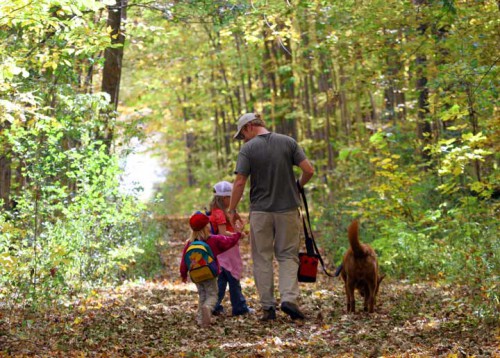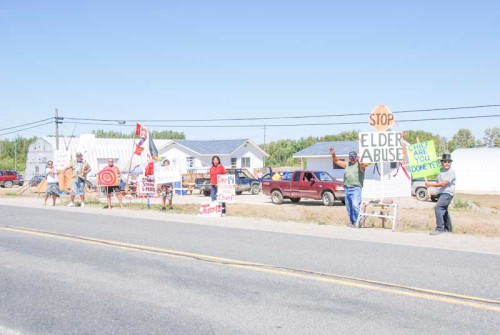BURPEE MILLS—A petition requesting that the provincial government cease and desist in declaring lands tax exempt has been making the rounds in the Township of Burpee Mills and beyond under the stewardship, and with the blessing, of the municipal council.
Councillor Wayne Bailey has nothing against conservation and wildlife, he just wonders why it is that residents in small rural communities are having to bear what he feels is a disproportionate portion of the burden—and he isn’t alone.
“I talked to the other (Township of Burpee Mills) councillors and I found that they were just as concerned as I was,” he said of the growing trend of properties in the township being designated by the provincial government as tax exempt.
“The amount of land being taken away from our tax base is becoming a serious concern,” he said. “To some people 1.1 percent of the tax base might not seem like a lot, but to municipal councillors who are watching every dollar and run a very tight ship it can be a serious burden.”
Mr. Bailey said that one of the issues of prime concern is that the municipality has many shared obligations with other municipalities in fire protection, ambulance, police and social services. “We would like to be able to contribute our share of the cost of these services,” he said. “We are simply asking the province to not put us into a difficult position where we cannot provide our fair share.”
The municipality is seeking three things from the province, said Mr. Bailey. “We are asking the province to put an end to the practice of declaring property tax exempt,” he said. Mr. Bailey maintains that the cost of maintaining conservation and wildlife reserves is borne disproportionately by local municipalities, while the benefits largely accrue to people living in larger urban centres.
“You can’t say to people you aren’t allowed to sell your property (to a nature conservancy or wildlife protection foundation),” said Mr. Bailey. “But the cost of providing base services in the municipality doesn’t really go down when these properties are pulled out of the tax base.”
If the province balks at discontinuing the practice of declaring properties tax exempt, then Mr. Bailey said the next option would be to provide funds in lieu of the lost taxes. “We already have that with the park in our municipality,” he said. “They built a quite a nice new road into there and we maintain it.” A win-win situation for all involved, he suggests.
Finally, if neither of those options is adopted, Mr. Bailey has one last stop-gap solution for the issue. “At least put a cap on the amount of land in a municipality that can be declared exempt,” he said.
Nature Conservancy spokesperson Robert Barnett responded to the petition in a letter to Burpee Mills Reeve Ken Noland and council, Algoma Manitoulin MPP Michael Mantha and Algoma Manitoulin Kapuskasing MP Carol Hughes noting that there are significant benefits to nature reserves in municipalities, including reduced municipal service requirements, that nature reserves bring services to communities through the benefit of the commons, citing a figure of $2,000 per acre per year as a cash figure, that visitors to nature reserves help build the tax base through the sale of services by local businesses and tourism operators and he suggested that part of the provincial partnership funding could be traced to the relatively low assessment per population in Burpee Mills.
Mr. Bailey said that he felt the Nature Conservancy should try to work together with the municipalities to find solutions to the issue, rather than their current approach.
He said that he respectfully questions the cash number cited as a benefit to residents in the community, noting that that benefit might well be accurate when the provincial population as a whole is considered.
“We don’t have a gas station or grocery store here to benefit from selling those services,” he said. “Most people gas up and pack groceries from home when they come to visit in their campers.”
“I understand why he would be worried about ending the tax exemptions,” said Mr. Bailey. “But they should be working together with us on resolving this.”
Simply put, Mr. Bailey said he would like to know why the cost of maintaining the commons has to fall on the residents of small rural communities with the least ability to pay.
Mr. Bailey maintains that there is more common ground than some might believe the case. “We are all conservationists,” he said of Manitoulin residents. “We all want to preserve the kind of life we have here. It is important to us. But we need help.”
The amount of money involved might seem irrelevant to someone who lives in the south. “Even my own son thinks we have it pretty good up here,” he said, noting that it costs a lot to provide services to rural populations stretched across a large geographical area, and yet those same rural populations do not have the kind of financial resources common in larger urban areas. “They just don’t understand the situation.”
Mr. Bailey maintains the burden of protecting wildlife and the environment should be borne by all of those who benefit from its conservation—not just small municipalities—and he asks if spreading those cost isn’t how the provincial taxation system is supposed to operate?
“We are hoping to draw the province’s attention to this,” he said of the petition they are circulating and hope to present to the legislature. “We just want things to be fair to everyone.”





